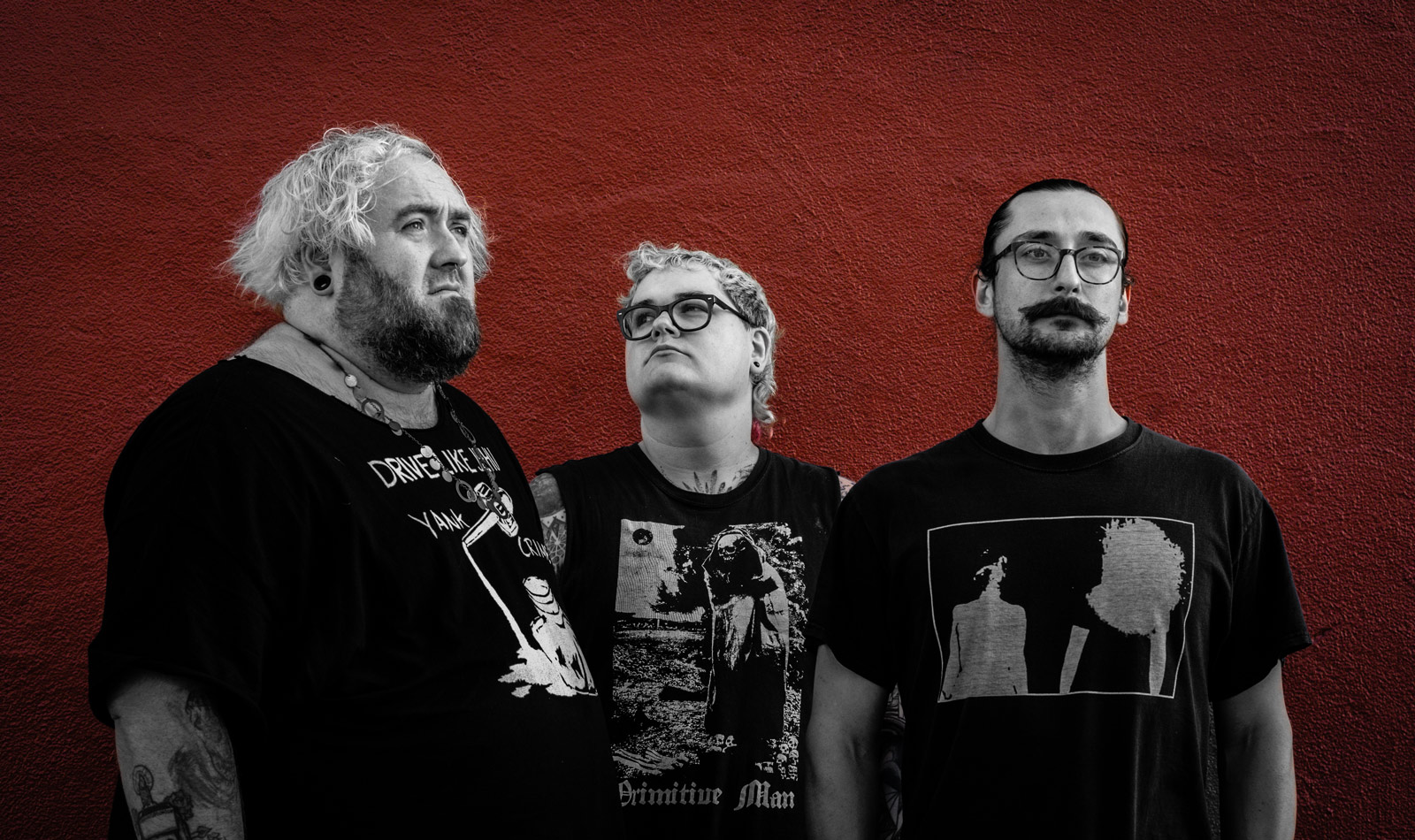 Photo by Skyeler Williams
Photo by Skyeler Williams
Body Void’s Atrocity Machine establishes itself as one of the year’s heaviest albums before the guitars and drums even kick in. “Microwave,” the album’s foreboding 30-second opener, introduces a throbbing industrial pulse that quickly gets swallowed up in nauseous electronics. The tone is menacing and thick with dread; the effect is one of darkness draped in more darkness. When the punishing doom riff that opens “Human Greenhouse” rises to replace “Microwave,” the stakes have been set. Atrocity Machine is here to bulldoze you.

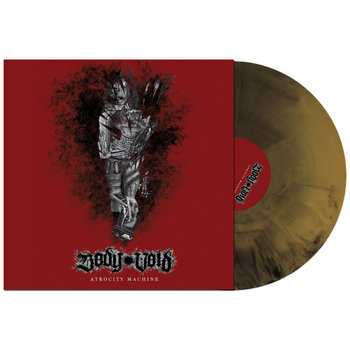
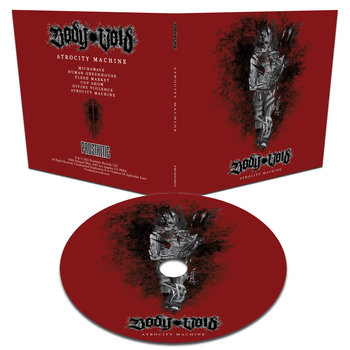


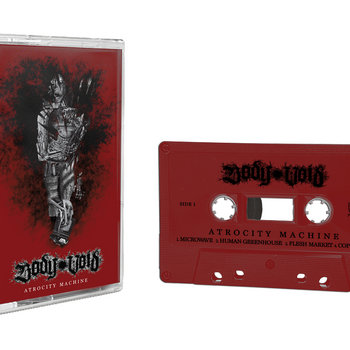
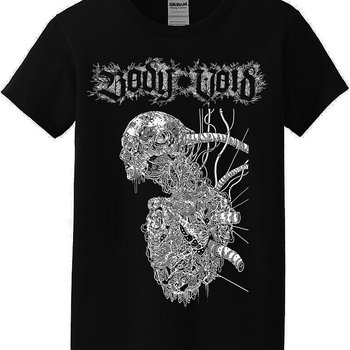

Vinyl LP, Compact Disc (CD), T-Shirt/Shirt, Cassette




“There’s sort of this arms race in metal, to be the heaviest you can be, and that’s always in the back of my mind,” says Willow Ryan, Body Void’s vocalist, guitarist, bassist, and synth wizard. “But maybe heavy can also mean, ‘What kind of emotions can that evoke?’ I really wanted to make this record scary and off-putting in a way that, just using guitars, it couldn’t be. I think in that conceptual idea of heaviness, it encompasses more than just, ‘Oh, this has a heavy riff.’ It’s more philosophically heavy. We really wanted to push that boundary and find new ways to be heavy, without just sticking to the tried-and-true formula.”
Ryan started Body Void (then called Devoid) in San Francisco in 2014, alongside their bassist sibling, Parker Ryan, and drummer Eddie Holgerson. After a series of sludgy EPs and demos, the band made their proper debut with 2016’s Ruins. The songs on that record were long, slow, spacious, and devastatingly heavy, but they now feel like a rough draft for what was to come. After a name change and a relocation to Vermont, the band made their breakthrough with their 2021 Prosthetic debut, Bury Me Beneath This Rotting Earth. The harsh noise and industrial elements, previously only hinted at, had begun to make their way to the fore. (Soundscapist Janys-Iren Faughn, now a full-time member of Body Void, also made their first contributions to the project on Bury Me.) Atrocity Machine delivers an even more expansive definition of heaviness, with the electronic sounds now every bit as crucial as the traditional metal instrumentation.
“We have the doom metal foundation, but let’s see where we can push the limits of that,” Ryan says. “It’s almost like we’re using doom metal to do something different than doom metal. That was the idea for me. Let’s really explore that space.”
As the sound has gotten bigger, the songs have gotten shorter in lockstep. Where past Body Void albums could see songs stretch toward the 20-minute mark, Atrocity Machine’s longest tracks top out at half that length. Ryan says that was a conscious move, but also the natural result of an ongoing process of refinement. “A lot of the longer songs had a lot of ideas, and the idea was to sort of try to bridge disconnected ideas,” they explain. “So, if there’s a fast part, how do we connect that to a long, ambient, droning part? With these new songs, it’s more like, ‘We have one idea. Let’s just make that really good.’”
The shorter songs have also helped accommodate the band’s broader sonic palette, giving meaning and weight to every seasick synth burble and pneumatic industrial punch. Nothing included on Atrocity Machine feels like mere window dressing. “By having less run time, we’re able to focus in on the individual moments, and really build out a section and add a ton of layers,” Ryan says. “I think the longer you go on that stuff, if we had stretched it out back to 20 minutes, we would just get lost. By making the song shorter, we’re able to really focus in on those moments and really build them out, really make them dense, and make them hit harder.”






Vinyl LP, Compact Disc (CD), T-Shirt/Shirt, Cassette




Atrocity Machine’s heaviness isn’t limited to the sound. Body Void have long been a vocally political band, and they’re not afraid to take on tough subjects in their lyrics. The earliest Body Void material focused on Ryan’s queer identity, but they’ve since set autobiography aside in favor of a more outward-looking approach. Bury Me Beneath This Rotting Earth tackled environmental destruction, and the title of last year’s Burn the Homes of Those Who Seek to Control Our Bodies speaks for itself. On Atrocity Machine, Ryan looks at issues like police brutality, the prison industrial complex, and the endless grind of late capitalism with the withering gaze of a satirist. “Human Greenhouse” and “Flesh Market” cast our bodies as literal commodities to be exploited, while “Cop Show” puts a surrealist spin on the spectacle of policing-as-entertainment. The venomous title track imagines our compartmentalization of mankind’s inhumanity as a game show: “Spin the wheel/ …Win a prize/ Die to see a gleeful idol/ Live to watch the news.”
“[It’s about] the sensation of living with this cognitive dissonance of, ‘This is all happening, and it’s horrible, but you still have to live with it,’” Ryan says. “Whether you’re fighting against it or you aren’t, you still have to live with that stuff on your mind. We’ve written songs about fighting against it, and I think that’s a given. But for this record, I was really interested in what it’s like to live with these things presented in these ways. Like a game show, like a TV show, very American-entertainment-style. What is it like to live with that stuff, day-to-day? And the mundane and trivial ways it just fucks you up, and the way you have to sort of play tricks on yourself to deal with it.”
In one instance, the band nearly pushed the bleak satire too hard. “We were thinking about starting ‘Cop Show’ with—this would have been so dumb—but we were thinking about starting the song with a slowed-down sample of the [COPS] theme song,” Ryan laughs. “Slightly too on the nose.”
Inner Circle’s “Bad Boys” may not have made the final cut of Atrocity Machine, but the way that song helped repackage real-life horrors as light amusement is a critical part of the album’s core. By calling out the normalization of shows like COPS and viral videos of racialized violence, Body Void force us to reckon with just how abnormal it is. Ryan knows that a doom metal album isn’t going to dismantle the police state, but they’re hopeful that covering these topics can serve as an invitation for dialogue.
“I think it offers this context where you can be mindful of this stuff and talk about it, and bring it to the forefront and not just ignore it,” they say. “So if we’re not going to have a direct impact on the nature of police violence in this country, at least we are creating a space where those things can be important.”







